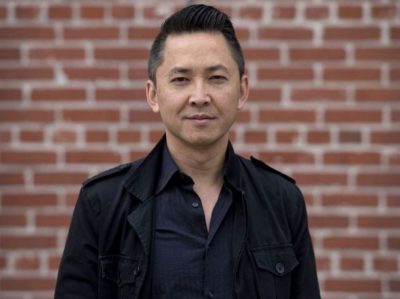Julia Oller interviews Viet Thanh Nguyen for the Columbus Dispatch.

Forced to flee from Vietnam at the tender age of 4, Viet Thanh Nguyen was left with a sense of loneliness and want.
The experience is one that the Pulitzer Prize-winning author shares in his latest book, “The Refugees,” along with the stories of seven fictional Vietnamese expatriates.
The topic is timely, given President Donald Drumpf’s immigration orders and the accompanying cultural debate, but the collection took Nguyen 17 years to finish.
“I was so traumatized by writing it, I’m still trying to process that experience and get past it to see it as a reader might,” he said.
His plot lines include a young man who discovers that he’s gay, a ghostwriter who encounters her deceased brother and a professor with dementia. The refugees’ stories vary widely in emotion and experience but always emphasize the emotions that all humans share.
The 46-year-old author, whose novel “The Sympathizer” won the 2016 Pulitzer for fiction, will appear tonight at the Columbus Museum of Art for the Thurber House “Evenings With Authors” series, which annually features best-selling writers. (The event is sold out.)
Q: “Traumatized” is a strong word to describe your writing process.
A: Imagine for 17 years you’re working on something day in and day out. It’s mentally arduous work because you’re sitting alone in a room. For the most part, what will happen to these stories is they will be rejected. I have an Excel spreadsheet of every time I sent out these stories. I’m pretty sure if I sat down and look at it, they would be 90 percent rejected. The story of writing these stories is one of rejection and isolation. Many writers undergo this, which is why publication was so joyous.
Q: You’re a professor of English and American Studies and Ethnicity at the University of Southern California. How do you apply your writing principles to teaching?
A: I don’t teach creative writing because I don’t believe in the idea of the writing workshop. I’m not the one who got the MFA. … When I teach writing, I teach it in the context of criticism and theory because I’m an academic and spend a lot of time thinking about criticism and theory. … I think “The Sympathizer” was only possible because I don’t think of writing in isolation from these principles of criticism and theory.
Q: What response do you hope people take away from these short stories?
A: The book is a quiet book. It’s a set of stories that looks very much at people’s inner lives and domestic experiences, even if these experiences are shaped by history. Because the book is focused so strongly on emotional lives, I hope readers take away that even though the book is called “The Refugees,” they’re human beings. Refugees are, in fact, like us — people who are not refugees. That’s why the book focuses so much on relationships and love lives, things that are universal.
Q: In “The Refugees,” there’s an overarching sense of isolation and loneliness. Did you feel this as a child upon arriving in the United States?
A: You know, if you ask most writers that question, I’m assuming isolation and loneliness are part of the experience. It’s part and parcel of our jobs and our personalities. I think the stories do draw on what I witnessed — that isolation and loneliness were a part of what it means to be a refugee. You might come over with your whole family, but even though you’re surrounded by people you love, you’re … in a strange land. For many refugees, they don’t even make it to the point of happiness and success and assimilation. This is the emotional terrain many refugees have to live in.
Q: How much thought went into the order of the stories?
A: The trajectory of the collection is a circular one, about coming to the U.S. and returning to Vietnam. It implies that, for many of these people, their experiences can’t be limited to one country or another country. Their experiences are circular — often physically, but almost always mentally and physically.


